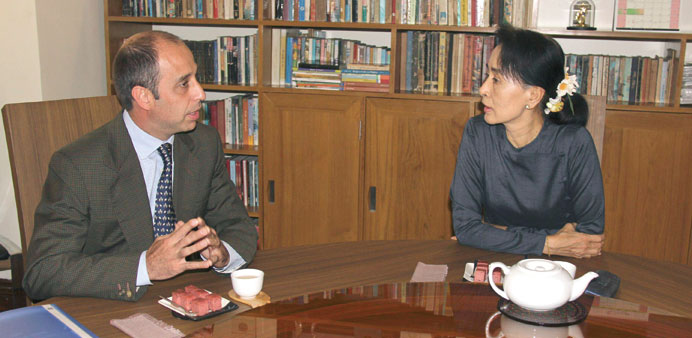Tomas Ojea Quintana, UN special envoy on human rights in Myanmar, meets with pro-democracy leader Aung San Suu Kyi in Suu Kyi’s home in Yangon yesterday.
AFP/Yangon
The UN yesterday raised concern over the Myanmar army’s “arbitrary arrest and torture” of men accused of being Kachin rebels, and urged further efforts to end hostilities in the far north.
UN special rapporteur on rights in Myanmar Tomas Ojea Quintana welcomed recent talks in China aimed at stopping the unrest in Kachin state that has undermined wider political improvements in the former pariah nation.
But he stressed the impact on local communities of the heavy fighting, which has displaced tens of thousands since a 17-year ceasefire between the army and rebel Kachin Independence Army (KIA) in broke down in June 2011.
Following a visit to the prison in state capital Myitkyina, Quintana said he was “concerned about the ongoing practice of arbitrary arrest and torture during interrogation by the military of Kachin men accused of belonging” to the KIA.
The envoy, who was speaking as he concluded a wide-ranging visit to Myanmar yesterday, said a large military presence in Kachin has meant that “serious human rights violations” continue.
The Myanmar government last month announced a unilateral ceasefire but the violence went on, with government troops capturing a key outpost and edging closer to the rebels’ headquarters near the Chinese border. Talks in China earlier this month were seen as only a limited step by the Kachin, who are fighting for greater autonomy and want negotiations to address their demands for more political rights.
A further round of talks involving other Myanmar ethnic groups are set to begin in northern Thailand in the coming days.
The government of reformist President Thein Sein, which took power following the end of decades of junta rule in 2011, has reached tentative ceasefires with most major ethnic rebel groups.
But around a dozen rounds of talks with the Kachin have failed to quell the violence.
Quintana said camps for thousands of people forced to flee their homes were becoming “permanent as the conflict goes unresolved”, adding humanitarian access remained a “challenge” despite a recent government decision to allow a UN convoy to deliver relief to rebel-held areas.

